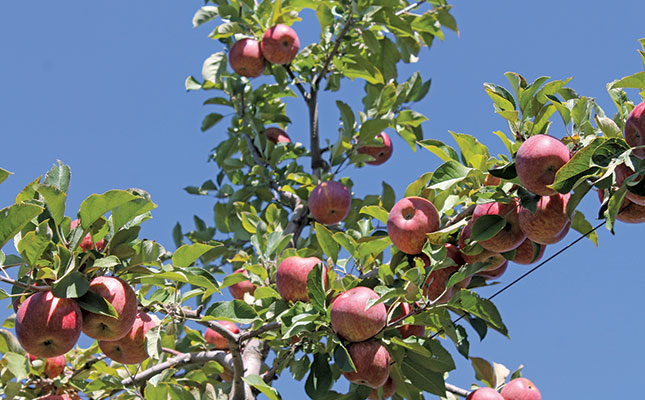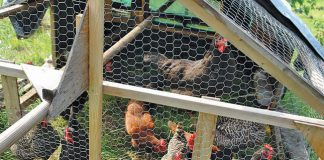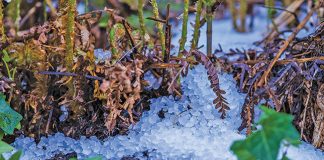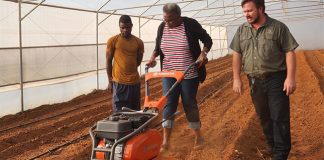
Photo: Jeandré van der Walt
Apple farming runs through the veins of the Zondaghs; the family have been growing apples on Matt Zondagh Estate in Avontuur, in the scenic Langkloof Valley, since the early 1900s. But the Zondaghs have occupied this land for far longer than that; Matt Zondagh Estate is a 10th-generation family farm, and according to Francois Zondagh, the current head of the farm, their forebears ran cattle.
Today, however, approximately 90% (200ha) of the estate is dedicated to apples, while pears account for the balance. The apple orchards yield on average 50t/ha.
Environmental sensitivity
Francois stresses that a great deal of work goes into growing an apple crop. This includes hiring a team of technical experts who visit the estate regularly. They advise on planning, establishing new orchards, soil preparation and fertiliser programmes.
These contractors also make recommendations on integrated pest management practices in order to minimise their pesticide use.
“This is very important due to the increasing pressure on farmers to be more innovative in reducing chemical use and residue on products sent to market. It is also very expensive to spray pesticides, so the less, the better,” says Francois’s son, Kosie.
They therefore focus on natural ways to combat pests, such as installing fruit fly traps baited with lures as well as attaching sticky weevil traps to the trunks of the trees. In addition to combating weevils and fruit flies, they regularly monitor the orchard for other pests and diseases.
The Zondagh family are committed to the principles of good land stewardship and sustainable farming practices.
Francois’s other son, Matt, named after their ancestor, who started the family farming business 10 generations ago, says they believe they have a responsibility to leave the farm and the planet in better shape for future generations.
In addition to controlling pests, they go to some lengths to maintain a healthy pollinator habitat to ensure that the crops are properly pollinated during fruit set.
The apple orchards on the estate comprise predominantly red apple varieties, such as Fuji, Royal Gala and Top Red.
Granny Smith trees have been planted between these varieties to attract pollinators.
According to Francois, there are many wild bees on the farm that contribute to the pollination of their crops but beehives are nonetheless hired to ensure adequate pollination.
Playing the market
Apple harvesting generally starts towards the end of January and is completed by May. After picking, the apples are placed in controlled-atmosphere storage.
“This slows the ripening process and maintains the firmness of the fruit. We can store our red apples for up to nine months, which gives us the ability to provide apples all year round, and play the market,” says Pieter-Matt Stemmet, Francois’s nephew.
The estate’s apples and pears are marketed and exported by Tru- Cape. Some of its red varieties, such as Top Red and Starking, are not exported, however, as they perform better locally.
A portion of the apples is exported to the EU and the UK, but Francois says they have shifted their exports more towards other African countries as well as the Far and Middle East.
A challenging season
The Zondaghs have experienced significant weather-related problems, including drought, hailstorms and late frost, over the past few months. Hail-damaged apples are sent to a juice factory in the Langkloof.
“There’s a strong demand for apples for juicing purposes, more than for stone fruit,
because apple concentrate is used as a base in a vast variety of other juices. This, along with the close proximity of the factory, is very fortunate for us,” says Francois.
In November last year, frost prevented the apple trees from flowering fully, limiting the pollination essential for fruit growth.
According to Kosie, the drought did not affect the operation too severely as they still have water to irrigate their orchards, but the little rain they received forced them to use their water more economically.
“But rain is needed to replenish our dams to see us through until the next season,” he says.
To use water more efficiently, they have installed soil moisture probes, and use the readings from these to schedule the irrigation. The farm is equipped with a micro-irrigation system and sawdust is used as mulch in the orchards.
Family focus
For the Zondaghs, running the business as a family is a key motivator. “It isn’t just a job to us. What you do, you do for yourself, because you have a share in the business,” says Pieter-Matt.
Francois admits that farming together can sometimes be difficult, as everyone is different.
But the family act as a sounding board for any business decisions, and “the experience and knowledge acquired over generations is irreplaceable”.
The workers of the estate and their families also play a pivotal role in the farm’s success.
“We have loyal families of farmworkers, many of whom have been working with us for generations,” says Francois.
Farming apples is labour-intensive, as harvesting is done by hand. “The apple industry is one of the biggest job creators in the Langkloof. We employ 200 workers in season and an additional 100 female workers in the packhouse.”
He adds that many of the latter are the spouses of the estate’s general workers, which increases the disposable income of the families. The estate operates a crèche so that employees’ children are looked after during working hours. The workers are also sent regularly for training.
Quality counts
“Never stay stagnant. Continually improve your business,” says Kosie.
He adds that they always strive to produce quality fruit.
“International markets value our produce and we want to maintain that reputation. The only thing you can control is the quality of the product you deliver to the client.”
According to Francois, the family would like to expand their farming business but they are cautious due to the current land reform policy.
Due to water constraints, they are replacing older orchards with newer cultivars and rootstocks.
With all the hurdles and challenges of farming, Kosie admits that remaining optimistic can be difficult.
“To stay positive is sometimes the biggest challenge of all,” he says.
For now, the family will continue to do what they love to the best of their ability.
For more information, email [email protected].











